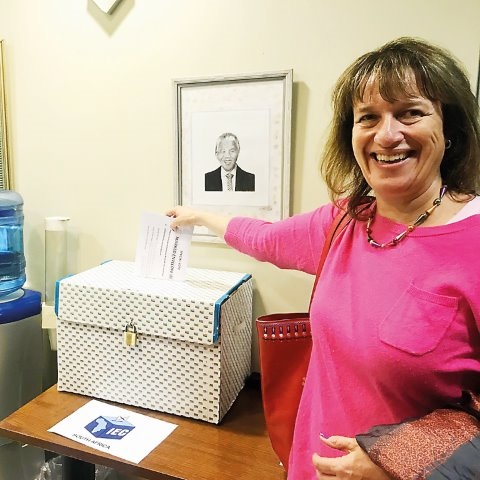click to dowload our latest edition
CLICK HERE TO SUBSCRIBE TO OUR NEWSLETTER


Published
5 years agoon
By
adminTALI FEINBERG
“As far as I know, I am the only person in the Southern California area that they are keeping the consulate open for so that I can vote after Shabbat,” said Wayburne prior to voting. “I still can’t believe they are keeping the consulate open until 23:00, just for me!”
Wayburne said he would drive to Los Angeles from his home in Irvine, Southern California, as soon as Shabbat ended to cast his vote.
This arrangement was worked out by the Independent Electoral Commission (IEC), the Department of International Relations and Cooperation (DIRCO), and the South African Jewish Board of Deputies (SAJBD) to allow South African Jews living overseas to vote in the upcoming national elections.
The day reserved for overseas voters to cast their ballot was this past Saturday, 27 April. However it was Shabbat, and the last day of Pesach, so observant Jews would not have been able to participate.
After engaging with Jewish voters abroad, the SAJBD asked the commission if the four foreign missions could stay open after Shabbat and the chag. The IEC confirmed the extension of voting hours at South African missions in London, Tel Aviv, New York, and Los Angeles.
Wayburne emigrated to the United States three years ago. His wife is American, and the couple wanted to offer their children the opportunity of living in the US. “I don’t trash South Africa, and I want the best for it, which is why I want to vote in these elections,” he says.
He was looking forward to interacting with South Africans at the consulate. “When you meet South Africans overseas, there are no divisions. There is a kind of kinship and silent solidarity.”
He feels that what the SAJBD is doing for South African Jewish expats is truly exceptional. “South African Jewish institutions are amazing. Because it is a smaller community, there is no insignificant Jew. In America, you are more or less on your own. In South Africa, there is always community support.”
Meanwhile in New York, Beth Ginsberg shared her experience. “Straight after Havdalah, ignoring the urge to binge on chametz, we drove for an hour to the New York consulate so that I could vote. We decided to bring our children with us, to teach them that voting is a right, privilege, and responsibility worthy of considerable effort.
“It is significant that election day fell on both Pesach and Freedom Day, and the extension of voting hours is a testament to the freedom of religion that South Africa espouses. The efforts of thousands of individuals – from the SAJBD and the IEC to the security personnel working overtime at South African missions abroad – deserve huge appreciation,” she said.
In London, Eli Lewenstein shared that, “It is an incredible honour and a privilege to be able to vote in another country. Being away from home, missing the official election day, and the vote being held on a Saturday here abroad in London, I thought I wouldn’t have the opportunity to make my mark, but thanks to the Jewish Board of Deputies for negotiating extended voting hours so we were able to cast our vote.”
He voted at the South African High Commission in Trafalgar Square. “Voting after Shabbat came out which is 21:14 here, there were no queues, and voting took me five minutes. I even met former Springbok rugby player Schalk Burger who also came to cast his vote.”
In Israel, Yoni Isaacson said, “When your country of birth opens its embassy until 23:30 for a handful of Shabbos-observant Jewish expatriates to vote, it’s worth the hour’s drive from Beit Shemesh to exercise that right. The right to vote should never be taken for granted, particularly by us Jews. Although my family and I have made our permanent home here in the holy land, our connections to South Africa remain strong through friends, community, business, and care for the wonderful people.”
Carole Pincus also voted in Israel. “We went by bus after Shabbat from Tel Aviv to Ramat Gan. The spirit in the room was wonderful. It felt really good that we had done our part. Thanks to all who helped to organise this,” she said.
Sy Mamabolo, the Chief Electoral Officer of the IEC, told the SA Jewish Report that in order to allow observant Jews to vote after Shabbat, “We had invoked internal consultations processes including discussions with the National Party Liaison Committee on the matter. Once internal discussions were concluded, discussions had to be had with DIRCO since the staff at the affected missions is under its employ. However there was general willingness across the board to assist Jewish compatriots.”
He said it was important to the IEC that voting hours be extended for observant Jews because “the electoral commission is acutely aware of the critical importance of providing opportunities for all citizens to vote, as this is intertwined with their right of citizenship. Voting is thus expressing one’s political choice on the one hand, and expressing one’s right to citizenship on the other. Ultimately the exercise was about asserting our common humanity as South Africans.”
